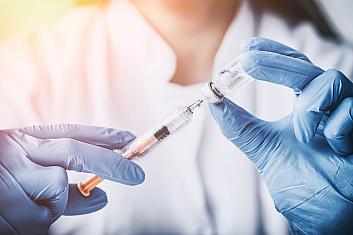A widely used tuberculosis vaccine is associated with reduced likelihood of contracting COVID-19 (coronavirus), according to a new study by Cedars-Sinai. The findings raise the possibility that a vaccine already approved by the Food and Drug Administration (FDA) may help prevent coronavirus infections or reduce severity of the disease.
The vaccine, known as Bacillus Calmette-Guérin (BCG), was developed between1908 and 1921 and is administered to more than 100 million children around the world every year. In the U.S., it is FDA-approved as a drug to treat bladder cancer and as a vaccine for people at high risk of contracting TB. The BCG vaccine is currently being tested in multiple clinical trials worldwide for effectiveness against COVID-19.
In the new study, published online Nov. 19 in the Journal of Clinical Investigation, investigators tested the blood of more than 6,000 healthcare workers in the Cedars-Sinai Health System for evidence of antibodies to SARS-CoV-2, the virus that causes COVID-19, and also asked them about their medical and vaccination histories.
They found that workers who had received BCG vaccinations in the past-nearly 30% of those studied-were significantly less likely to test positive for SARS-CoV-2 antibodies in their blood or to report having had infections with coronavirus or coronavirus-associated symptoms over the prior six months than those who had not received BCG. These effects were not related to whether workers had received meningococcal, pneumococcal or influenza vaccinations.
The reasons for the lower SARS-CoV-2 antibody levels in the BCG group were not clear, according to Moshe Arditi, MD, director of the Pediatric and Infectious Diseases and Immunology Division at Cedars-Sinai and co-senior author of the study.
"It appears that BCG-vaccinated individuals either may have been less sick and therefore produced fewer anti-SARS-CoV-2 antibodies, or they may have mounted a more efficient cellular immune response against the virus," said Arditi, professor of pediatrics and biomedical sciences. "We were interested in studying the BCG vaccine because it has long been known to have a general protective effect against a range of bacterial and viral diseases other than TB, including neonatal sepsis and respiratory infections."
In the new study, the lower antibody levels in the BCG group persisted despite the fact that these individuals had higher frequencies of hypertension, diabetes, cardiovascular diseases and COPD, which are known risk factors for being more susceptible to SARS-CoV-2 and developing the more severe forms of COVID-19 illness.
While noting that no one believes BCG will be more effective than a specific vaccine for COVID-19, Arditi explained that it could be more quickly approved and made available, given that it has a strong safety profile demonstrated by many years of use. "It is a potentially important bridge that could offer some benefit until we have the most effective and safe COVID19 vaccines made widely available," he said.
"Given our findings, we believe that large, randomized clinical trials are urgently needed to confirm whether BCG vaccination can induce a protective effect against SARS-CoV2 infection," said Susan Cheng, MD, MPH, MMSc, associate professor of cardiology and director of public health research at the Smidt Heart Institute at Cedars-Sinai. She was the other co-senior author of the study. The first author was Magali Noval Rivas, PhD, assistant professor of pediatrics at Cedars-Sinai.
In fact, a number of randomized clinical trials have been launched to study the potential protective effects of BCG vaccination against COVID-19. Along with Texas A&M University, Baylor College of Medicine, and the University of Texas MD Anderson Cancer Center, Cedars Sinai is a site for the U.S. arm of this ongoing trial, which is recruiting hundreds of healthcare workers. Arditi serves as the principal investigator of this clinical trial at Cedars-Sinai.
"It would it be wonderful if one of the oldest vaccines that we have could help defeat the world's newest pandemic," Arditi said.
Research reported in this publication was supported by Cedars Sinai, the National Cancer Institute of the National Institutes of Health under award number U54 CA26059 and the Erika J. Glazer Family Foundation.
Source: Cedars Sinai

Be the first to comment on "Study Indicates TB Vaccine Linked to Lower Risk of Contracting COVID-19"